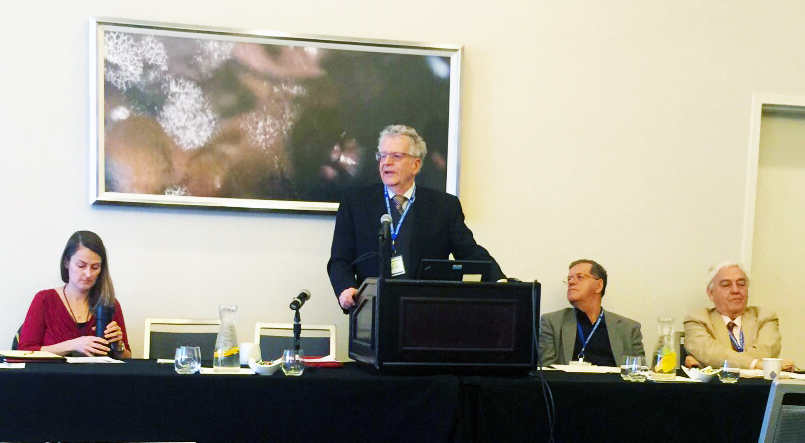In early April, researchers from around the world met in Arlington, Virginia for the 17th annual Alcohol Policy (AP) Conference. ARG scientists were among the presenters and featured Center Director William C. Kerr’s plenary session on alcohol privatization, highlighting his recent work in Washington State.
Senior Scientist Thomas K. Greenfield and Scientist Katherine Karriker-Jaffe presented their research on alcohol’s harms to others (AHTO) during a panel discussion that sought to determine viable, specific steps needed to translate findings into action. Look for more work in this area as Greenfield and collaborators begin a new four-year NIAAA-funded study on alcohol’s harms to others across multiple countries.
Poster presentations included five ARG researchers discussing their work on a range of topics.
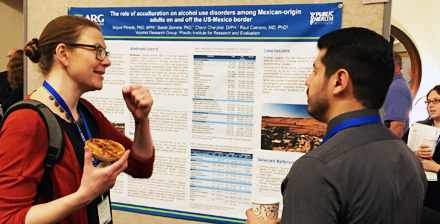 The Role of Acculturation on Alcohol Use Disorders Among Mexican Origin Adults On and Off the U.S. – Mexico Border
The Role of Acculturation on Alcohol Use Disorders Among Mexican Origin Adults On and Off the U.S. – Mexico Border
Postdoc Miguel Pinedo’s poster described alcohol use disorders (AUD) among a sample of Latinos living on and off the US-Mexico border. It included causal mechanisms underlying how and why acculturation shapes risk to AUD and differential impacts of acculturation on AUD by environmental contexts (i.e., border vs. off border) and sex.
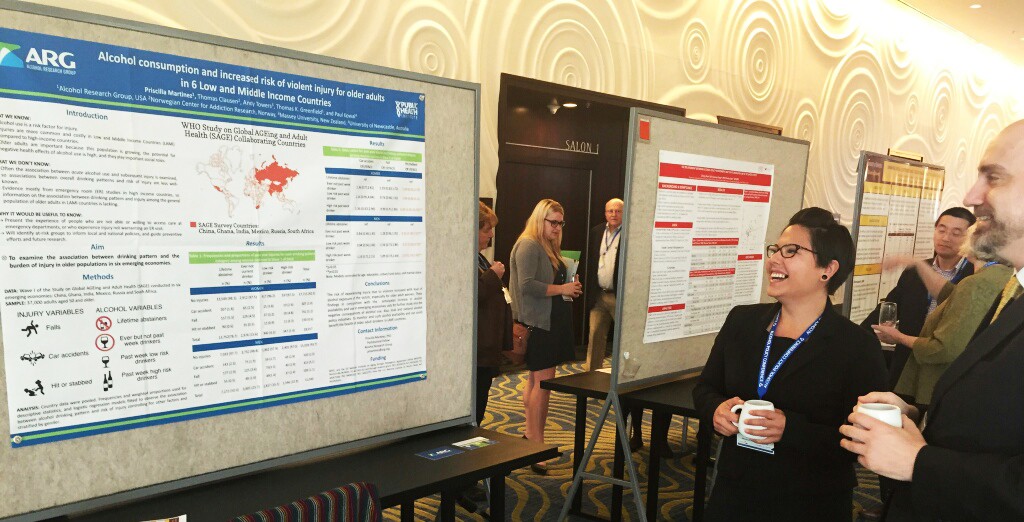 Alcohol Consumption and Increased Risk of Violent Injury for Older Adults
Alcohol Consumption and Increased Risk of Violent Injury for Older Adults
Associate Scientist and ARG Postdoc Priscilla Martinez’s work looked at the influence of drinking patterns on injury among older adults. Using data from the Study on Global AGEing and Adult Health (SAGE) conducted in six emerging economies, Martinez and her team discussed their findings in light of the growing presence of alcohol advertising in low and middle income countries, and the potential for policy initiatives to develop interventions to reduce the risk of violence among heavy drinkers.
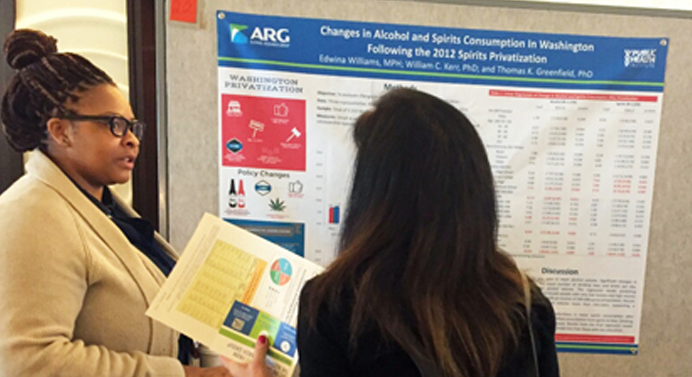 Changes in Alcohol and Spirits Consumption in Washington following the 2012 Spirits Privatization
Changes in Alcohol and Spirits Consumption in Washington following the 2012 Spirits Privatization
Research Associate Edwina Williams’s research used random-digit dialing to assess past month alcohol and spirits consumption among Washington residents to compare mean consumption before and after privatization. Results revealed a decline in spirits consumption with men consuming more alcohol products since privatization than women.
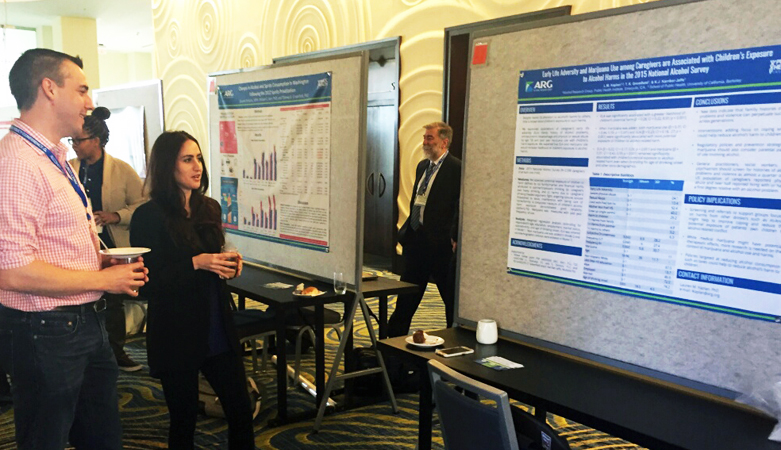 Early Life Adversity and Marijuana Use among Caregivers are Associated with Children’s Exposure to Alcohol Harms in the 2015 National Alcohol Survey
Early Life Adversity and Marijuana Use among Caregivers are Associated with Children’s Exposure to Alcohol Harms in the 2015 National Alcohol Survey
Despite recent United States attention to alcohol’s harms to others, little is known about children’s exposure to such harms. Associate Scientist Lauren Kaplan and her team found that family histories of alcohol problems and violence can perpetuate such harms across generations. Interventions that focus on a caregiver’s early life adversity and ways to cope could help reduce alcohol’s harm to children.
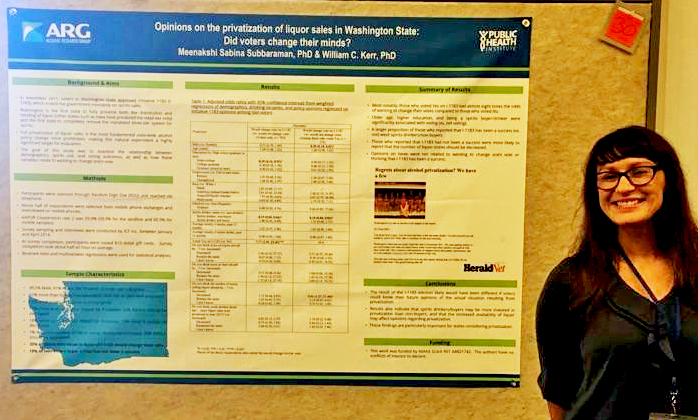 Opinions on the Privatization of Liquor Sales in Washington State: Did Voters Change Their Minds?
Opinions on the Privatization of Liquor Sales in Washington State: Did Voters Change Their Minds?
Biostatistician Meenakshi Sabina Subbaraman examined the relationship between demographics, spirits use, and voting outcomes, as well as how these variables relate to wanting to change one’s vote on spirits privatization. Result indicated that election results would have been different if voters could know their future opinions of the actual situation resulting from privatization. The study also found that spirits drinkers/buyers may be more invested in privatization than non-buyers, and that the increased availability of liquor may affect privatization opinions.
About the conference: The alcohol policy conferences are a series that, from its outset in 1981, have been a forum for researchers, community practitioners, and public officials to meet and exchange findings, explore evidence-based solutions, and consider adoption of policies aimed at minimizing risks associated with alcohol use. The conferences have been organized by governmental, non-governmental and private organizations over the years. The current conference is coordinated by the U.S. Alcohol Policy Alliance, a national coalition of state coalitions working on alcohol policy and independent of commercial interests, in partnership with Project Extra Mile, a Nebraska-based nonprofit that works to prevent underage drinking.
